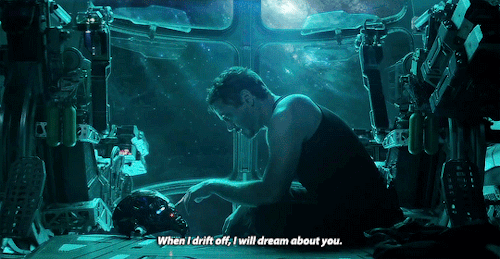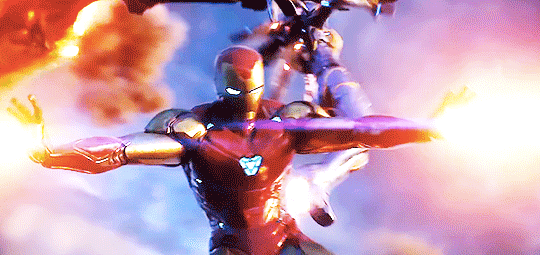Avengers: Endgame is a lovestory about Tony and Pepper
/In the end of this MCU story arc, love is all that matters.

This was originally published on cosgrrrl.com.
It’s taken two viewings, many conversations, and several weeks of grieving the end of two of the most loveable heroes in cinema history, but I’ve finally settled on a critical analysis of Endgame I feel comfortable with. It was too simple for me to see initially, and will probably be an unpopular opinion for that reason. It ignores all the villains, and ambivalently discards the themes of militarization vs peace which Iron Man demonstrates so well in movies 1–3, and in Avengers: Age of Ultron and Avengers: Civil War. It doesn’t even toy with the morality of Thanos’ philosophy that destruction is necessary for new life. No: my theory is very simple, and could be easily gleaned from the very first Iron Man.
It’s a lovestory. Specifically, it’s the story of Tony Stark and Pepper Potts.
And although it sounds trite, I think it’s actually very powerful.
We all have our subject areas and character traits we’re sensitive to, based on our own personal circumstances and background; I always take particular note of the dynamics between romantic partners. Is it a mutual relationship, or is there an imbalance of respect and power? Are they focused on building one another up, or only themselves? Do they demonstrate they genuinely know and care about their partner, through their actions? Are they more powerful together than apart, or do they simply perpetuate one another’s cycles of trauma? The classic Hollywood archetypes of damsel in distress and knight in shining armor are rarely able to pass this sniff test.
I have a low tolerance for Hollywood’s portrayal of imbalanced/unhealthy relationships — probably because I’ve been in some (one for seven years), and I find anything resembling the abuser/co-dependent dynamic rather triggering, frankly. But also because I know that healthy relationships do exist, and can exist, and can be portrayed easily in film. They make, as my husband likes to point out, way more logical and interesting film characters than your standard fare.
“Every single stupid horror movie sweetheart,”
he tells me after watching a new trailer,
“when the wife comes to the husband telling him she saw some crazy shit, he doesn’t believe her. What the fuck is that? What kind of married people don’t believe each other when they saw some crazy shit? If you ran into the room telling me some crazy shit was going down, I’d be like ‘all right, let me grab my bugout bag and let’s go!’ Who are these couples who don’t fucking trust each other? What is that?”
A true partnership is a hard thing to come by, for sure. But my parents had it, and I’ve seen plenty of others IRL have it. I found mine, after some notable trial and error. It’s not, perhaps, what one finds the majority of the time, but it’s not so rare as you’d think, either.
But, like any true depiction of humanity, the story of a true partnership is a more complex story than the troupe of the damsel and the knight.
Which is why it’s so beautifully refreshing to find it represented in the development of our favorite characters — which brings us back to our unlikely mascots for a healthy marriage: Tony and Pepper.

The first thing we see in Avengers: Endgame is an emaciated, dying Tony Stark talking to his helmet in the hopes the messages will be delivered someday. And who is he talking to?
To Pepper, of course.
It’s always you,
he says, summoning their entire personal history in one phrase by echoing other circumstances in which he’s told her this throughout their professional and romantic relationship.
It’s always been you,
he said when he handed her the keys to his company.
We knew it way back in the first Iron Man. Pepper’s always been the only one for Tony.
Pepper Potts has always been the only human capable of both loving Tony Stark unconditionally and wrangling him into being responsible, and whole. She may not be a physics genius like Tony, but she’s far more emotionally intelligent than him, and plenty smart enough to manage the details of the chaotic universe Tony and his Stark Enterprises create around them. And even more importantly: she sees Tony for who he is. Not as the billionaire/genius/playboy/philanthropist, but as the man who’s conflicted about his own mortality and his responsibilities in this life. And she has compassion for him — as well as reasonable boundaries for herself.
Pepper is the only thing that keeps Tony from allowing himself fly off into suicidal missions — like he does in Avengers: Civil Wars, when his obsession with militarization has temporarily cost him his connection with Pepper. But Steve Roger’s parting words to Tony in his letter about the importance of family strike home, and by the time we catch back up with them in Spiderman: Homecoming, it’s clear that Pepper accepts Tony back as who he is: burdened by his mission — his self-assigned responsibility to protect the planet. Pepper is the force that keeps Tony grounded, and keen on learning from his mistakes.
As any good relationship is (we could talk about Shiva and Parvati as a model), Tony and Pepper’s relationship is powerful because it’s not hierarchical; it’s complimentary, and balanced. They each bring out the best in one another. Tony gives Pepper respect, equal status, and employment and responsibility that’s worthy of her time and talent, and Pepper gives Tony a reason to ground himself and not be an asshole.
Their relationship has, IMO, all the hallmark traits of a balanced and healthy relationship:
-
They’re secure in their relationship — i.e. it’s for them, not for other people. At the end of Spiderman: Homecoming, the official engagement was ill-timed and presented for purely pragmatic, “unromantic” reasons, which was passed off by all with a laugh. Tony bought the ring as soon as they started dating, which we all really knew, anyway. No stereotypical girl outrage at a lack of poised fanfar from Pepper; just a woman who knows her partner well.
-
They protect each other. In the beginning Iron Man 3, when the Stark mansion is attacked and Tony calls his suit to protect Pepper first, we see a beautiful example of a partnership working together the way they should: they each instinctively act to protect the other. Suited up Pepper immediately saves Tony, as predicted, because good partners always have each others’ backs.
-
They see each other. Tony gives Pepper free reign of all his assets because he knows she’s more capable of managing them than he is; Pepper sees (and inspires, one could say) Tony’s mission of protection. In the aftermath of Civil Wars, it’s Pepper who catches him and brings him down from suicidal missions. In Infinity Wars and Endgame, we see Pepper flex her stance on Tony’s retirement, both out of reasonableness for the threat of Thanos and because she knows her man, and knows what he’s been tasked to do. When Tony discovers a way to bring everyone back from the Decimation, Pepper knows there’s only one path before him, and rather than resenting him for it, she supports him.
Which, of course, brings us up tidily to the very end of Endgame.

#powercouplegoals
Pepper’s there, of course, at his side in the final battle, wearing the Rescue armor he’s made for her which she’s clearly trained in.
And as Tony is dying after sacrificing himself for galactic peace, Pepper gingerly removes Peter Parker from his side, and pulls a gut wrenchingly stoic performance.
“Tony, look at me. We’re gonna be okay. You can rest now.”
My husband pointed out how selfless her words were when we left the theater.
It was exactly what he needed to hear.
That’s what he’d sacrificed literally everything for — for his family to be safe. So Pepper did what any truly loving partner would do: she gave him closure before his passing.
In the aftermath, Tony’s life with Pepper, of course, inspires Steve Rogers to linger by Peggy Carter’s side back in his timeline after returning the Infinity Stones, to get himself “some of that good life.” And he does. Happily.
Which underlines my theory that Endgame’s message — and arguably the cumulative message of the vast majority of the MCU — is simple: love is all that matters. True love. The right love. Partnerships with individuals who are our equals, and who value us for exactly who we are.
I know it’s not the nerdliest theory, nor the most complex analysis. But the simplest stories are often the most powerful.
And perhaps, with the desolation and destruction of Thanos and his thugs in the galactic background standing as a metaphor for the death and destruction and division which lies all around us in our society and economy and ecology, a simple reminder of the power of love is exactly what we need.












